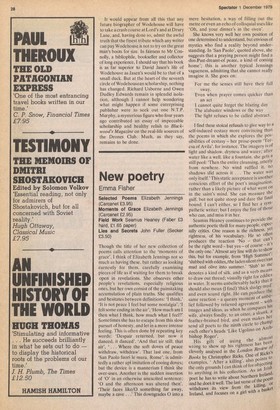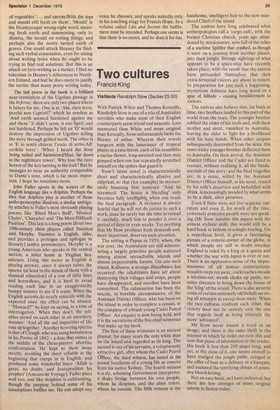New poetry
Emma Fisher
Selected Poems Elizabeth Jennings (Carcanet £3.95) Moments of Grace Elizabeth Jennings (Carcanet £2.95) Field Work Seamus Heaney (Faber E3 hard, £1.65 paper) Lies and Secrets John Fuller (Secker £3.50) Though the title of her new collection of poems calls attention to the 'moments of grace'. I think of Elizabeth Jennings not so much as having these, but rather as looking earnestly for them. carefully examining pieces of life as if waiting for them to break open in revelations. She observes other people's revelations, especially religious ones, but her own consist of the painstaking accumulation of plain truths. She qualifies and hesitates between definitions: 'I think,' 'It is not peace I feel but some nostalgia', 'I felt some ending in the air', 'How much am I then what I think, how much what I feel?' Sometimes she has to escape from this slow pursuit of honesty. and let in a more intense feeling. This is often done b repeating key words: 'Despair returned, but now it danced, it danced'. 'And that air still, that air', . Where the soft doves of peace withdraw, withdraw'. That last one, from 'San Paolo fuori. le mura, Rome'. is admittedly a rather apt imitation of cooing doves; but the device is a mannerism I think she over-uses. Another is the sudden insertion of '0' in an otherwise unexcited sentence: '0 and the afternoon was altered then', 'Their faces like/0 something far away, maybe a cave ..' This downgrades 0 into a mere hesitation, a way of filling out the metre or even an echo of colloquial uses like 'Oh, and your dinner's in the oven'.
She knows very well her own position of one determined to understand, but envious of mystics who find a reality beyond understanding. In 'San Paolo', quoted above, she suggests that a praying person might find a dim /Past-dreamt-of peace, a kind of coming home'; this is another typical Jennings vagueness, admitting that she cannot really imagine it. She goes on: For me the senses still have their full sway.
Even when prayer comes quicker than an act I cannot quite forget the blazing day The alabaster windows or the way The light refuses to be called abstract.
I find these stoical refusals to give way to a self-induced ecstasy more convincing than the poems in which she explores the possibilities of ecstasy — her prose-poem 'Teresa of Avila'. for instance. The imagery is of light and shadow, dryness and water; after water like a well, like a fountain, she gets a still pool: 'Then the entire cleansing, utterly from nowhere. No wind ruffled it, no shadows slid across it . . . The water was only itself.' This static acceptance is another conscious effort of the poet's imagination, rather than a likely picture of what went on in the saint's mind. She can measure the gulf, but not quite stoop and dare the final bound. I can't either, so I find her a sYln" pathetic writer; but I enjoy the fire of those who can, and miss it in her. Seamus Heaney continues to provide the authentic poetic thrill for many people, esPec" ially critics. One reason is the richness, Yet rightness, of his vocabulary. He so often produces the reaction 'No — that can't be the right word — but yes — of course — it's the only one.' Almost any line will do to show this, but for example, from 'High Summer': `slubbed with eddies,/the laden silent river/ran mud and olive into summer.' Slub' to nic denotes a kind of silk, and as a verb means to draw out thread; visually right for eddies in water. It seems unbelievably lucky that it should also mean (I find) 'thick sludgy mud' and even sound right. He can produce the same reaction — a queasy moment of unbelief fdllowed by relieved agreement — With images and ideas, as when he compares his wife, always fondly, to an otter, a skunk. a feather-brained bird, and even makes her send all poets to the ninth circle to chaniP ebaischhoopthReorg'serheads 'Like Ugolino on Arch His gift of using the almost wrong to show up his rightness has cleverly analysed in the London Review Ks Books by Christopher Ricks. One of Ricktso' examples, After a killing', also points. the only grounds! can thinkof for objecti.ri to anything in his collection. As an WA., ;poet he has to write about Northern Ireland. and he does it well. The last verse of the poetn d _r withdraws its view from the killing, ,_u_st Ireland, and focuses on a girl with a bas6c of vegetables'.. . and carrots/With the tops and mould still fresh on them', 'Mould' is the Heaneyesque wrong-right word, meaning fresh earth and summoning, only to dismiss, the mould on rotting things, and perhaps also the newly turned earth of graves. One could attack Heaney for finding such verbal consolation, even for sitting about writing lyrics when he ought to be trying to find real solutions. But this is an attack on lyric-writing as a metier; I find no tokenism in Heaney's references to Northern Ireland, and feel he does more to justify the metier than many poets writing today.
The last poem in the book is a brilliant near-translation of the Ugolino passage in the Inferno; there are only two places where it falters for me. One is at `Ahi, dura terra, perche non t'apristi?' which he renders as 'And earth seemed hardened against me and them.' It didn't seem, it was hard; and not hardened. Perhaps he felt an '0' would destroy the impression of Ugolino telling the story through gritted teeth. The other is at `E io sentii chiavar l'uscio di sotto/All' orribile torte': 'When I heard the door being nailed and hammered/Shut, far down in the nightmare tower'. Why lose the bare horror of the key turning in the lock? But he manages to wear an authority comparable to Dante's tone, which is far more important. I hope he translates more.
John Fuller sports in the waters of the English language like a dolphin. Perhaps the idea that dolphins play is another of those anthropomorphic illusions; a similar ambiguity attaches to Fuller's most obviously playing poems, like 'Blind Man's Buff', 'Musical Chairs', 'Charades' and 'The Most Difficult Position'. This last is a long poem about two 19th-century chess players called Staunton and Morphy. Staunton is English, older, and provides a prologue and epilogue in (loosely) iambic pentameters. Morphy is a young American who speaks in the central section, a letter home in Virgilian hexameters. Using this metre in English is playing anyway, since it always raises the spectre (at least in the minds of those with a classical education) of a row of little lines and horseshoes, and it is hard to avoid reading each line in an exaggeratedly bumpy manner to see if it scans. When the English accents do nearly coincide with the expected ones, the effect can be absurd: "Howard?" he kept on saying, in a tone of interrogation.' When they don't. the syllables crowd on each other in an unorderly manner: 'And all the sad impurities of life rose up together,' Another hovering spectre is that of Clough, who was using hexameters in his Poems of 1862 — a date that comes in the middle of the chess-players' abortive confrontation. He kept to them more strictly, avoiding the short syllable at the beginning that creeps in in English, and produced some wonderful lines: 'Allah is great, no doubt, and Juxtaposition his prophet' (Amours de Voyage). Fuller plays well too, and like dolphins is exhilarating, though the purpose behind some of his assumptions baffles me. He can adopt any voice he chooses, and speaks nakedly only in his touching elegy for Francis Hope. In a volume called Lies and Secrets the bafflement must be intended. Perhaps one secret is that there is no secret, and he does it for fun.












































 Previous page
Previous page